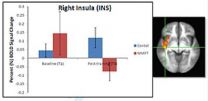(Press-News.org) Researchers from the University of California, San Diego School of Medicine and Naval Health Research Center have found that mindfulness training – a combination of meditation and body awareness exercises – can help U.S. Marine Corps personnel prepare for and recover from stressful combat situations.
The study, published in the May 16, 2014 online issue of the American Journal of Psychiatry, suggests that incorporating meditative practices into pre-deployment training might be a way to help the U.S. military reduce rising rates of stress-related health conditions, including PTSD, depression and anxiety, within its ranks.
"Mindfulness training won't make combat easier," said Martin Paulus, MD, professor of psychiatry and senior author. "But we think it can help Marines recover from stress and return to baseline functioning more quickly."
Drawing on the teachings of Zen Buddhism, scientists describe mindfulnes as a mental state characterized by "full attention to the present moment without elaboration, judgment or emotional reactivity." Mindfulness training, traditionally practiced through sitting meditation, attempts to cultivate this mental state by quieting the mind of extraneous thoughts.
In the study, Marine infantrymen in four platoons at Marine Corps Base Camp Pendleton took an eight-week course in mindfulness, tailored for individuals operating in highly stressful environments.
The course included classroom instruction on meditation and homework exercises, as well as training on interoception – the ability to help the body regulate its overall physical equilibrium (homeostasis) by becoming aware of bodily sensations, such as tightness in the stomach, heart rate and tingling of the skin.
"If you become aware of tightness in your stomach, your brain will automatically work to correct that tightness," Paulus explained.
Participating Marines, along with others who had not undergone mindfulness training, then spent a day in mock immersive combat at a 32,000-square-foot training facility staged to resemble a rural Middle Eastern village. During the day's exercises, Marines patrolled the village, met village leadership and responded to a highly realistic ambush.
The scientists found that the heart and breathing rates of those who had received mindfulness training returned to their normal, baseline levels faster than those who had not received the mindfulness training. Blood levels of a tell-tale neuropeptide suggested that the mindfulness-trained Marines experienced improved immune function, as well.
Subsequent magnetic resonance imaging scans revealed that the mindfulness-trained Marines had reduced activity patterns in regions of the brain responsible for integrating emotional reactivity, cognition and interoception. Lori Haase, a postdoctoral fellow in Paulus' lab and a co-author of the study, said similar brain activity patterns had been observed in high performance athletes and Navy seals. High-activity levels in these areas of the brain, she noted, are associated with anxiety and mood disorders. The scientists hypothesize that reduced brain activity in the anterior insula and anterior cingulate may be characteristic of elite performers in general.
"That we can re-regulate the activity in these areas with so little training is this study's most significant finding," Paulus said. "Mindfulness helps the body optimize its response to stress by helping the body interpret stressful events as bodily sensations. The brain adds less emotional affect to experiences and this helps with stress recovery."
INFORMATION:
This research was funded, in part, by the Office of Naval Research Code 30 and Navy Bureau of Medicine and Surgery.
Co-authors include Douglas Johnson, Naval Health Research Center, Warfighter Performance Department and UCSD Department of Psychiatry; Nate Thom, Naval Health Research Center, Warfighter Performance Department; Elizabeth Stanley, Walsh School of Foreign Service, Georgetown University and Mind Fitness Training Institute; Alan Simmons, Pei-an Shih and Wesley Thompson, UCSD Department of Psychiatry; Thomas Minor, UCLA Department of Psychology; Eric Potterat, Naval Special Warfare Command.
War and peace (of mind)
Meditation training may help reduce stress disorders among US military personnel
2014-05-16
ELSE PRESS RELEASES FROM THIS DATE:
Male infertility linked to mortality in study led by Stanford researcher
2014-05-16
STANFORD, Calif. — Men who are infertile because of defects in their semen appear to be at increased risk of dying sooner than men with normal semen, according to a study led by a researcher at the Stanford University School of Medicine.
Men with two or more abnormalities in their semen were more than twice as likely to die over a roughly eight-year period as men who had normal semen, the study found.
Smoking and diabetes — either of which doubles mortality risk — both get a lot of attention, noted the study's lead author, Michael Eisenberg, MD, PhD, assistant professor ...
Magnets and kids: A dangerous duo
2014-05-16
Cincinnati, OH, May 16, 2014 -- Magnet ingestions by children have received increasing attention over the past 10 years. With the growing availability of new and stronger neodymium-iron-boron magnets being sold as "toys," there has been an increase of cases of ingestion, resulting in serious injury and, in some cases, death. In a new study scheduled for publication in The Journal of Pediatrics, researchers studied the trends of magnetic ingestions at The Hospital for Sick Children (SickKids), Canada's largest children's hospital.
Matt Strickland, MD, and colleagues ...
Study reveals 1 in 10 16-year-olds surveyed have considered self-harm
2014-05-16
One in ten 16-year-olds surveyed in a new study by Queen's University and the University of Ulster have considered self-harm or taking an overdose.
The results of the annual Young Life and Times (YLT) survey, which are published today (Friday 16 May) during Mental Health Awareness Week, also found that almost a third of 16-year-olds questioned had experienced serious personal, emotional or mental health problems at some point in the past year.
1,367 16-year-olds across Northern Ireland took part in the 2013 survey undertaken by ARK, a joint initiative by Queen's University ...
Living conditions in Iraq must improve if investment in health system is to yield results
2014-05-16
Despite enormous investment in Iraq's health system in the 10 years since the US-led invasion, the health condition of Iraqis has deteriorated and will fail to improve unless more is done to improve living conditions. A review published today in the Journal of the Royal Society of Medicine concludes that continual investment in health services is crucial to elevate the health status of the Iraqi population, but that progress will be limited without improvements in housing, water and sanitation, electricity, transport, agriculture, education and employment.
The study was ...
Interrupted breathing during sleep affects brain neurons necessary to regulate heart rate
2014-05-16
Interrupted breathing during sleep affects brain neurons necessary to regulate heart rate
Sufferers of a common sleep-breathing disorder have diminished activity among neurons responsible for keeping heart rate low, reveals a new study published today [16 May] in The Journal of Physiology.
The research discovered that in obstructive sleep apnoea (OSA), neurons in the brainstem that control heart rate experience a blunting of their activity. The reduction of neuronal activity likely contributes to the increased heart rate, blood pressure and risk of adverse cardiovascular ...
Two large meals (breakfast and lunch) better than 6 small meals with same calories for controlling weight and blood sugar in people with type 2 diabetes
2014-05-16
Research published in Diabetologia (the journal of the European Association for the Study of Diabetes) suggests that two large meals (breakfast and lunch), rather than six small meals with the same total calories, are better for controlling weight and blood sugar in people with type 2 diabetes. The research is by Dr Hana Kahleová, Diabetes Centre, Institute for Clinical and Experimental Medicine, Prague, Czech Republic, and colleagues.
The study assessed 54 patients (29 men, 25 women) treated with oral diabetes drugs, aged 30–70 years, BMI 27–50 kg/m2 and HbA1c of 6–11.8% ...
Complex interactions may matter most for longevity
2014-05-16
PROVIDENCE, R.I. [Brown University] — If studying a single gene or a diet that might extend longevity is like searching for a fountain of youth, then a new study calls for looking at something more like the whole watershed. Brown University biologists who experimentally throttled three such factors in fruit flies found that lifespan depended more on interactions among the factors than on the factors themselves.
"I think the main lesson is that these interaction effects are as significant or important as the [single] effects, such as diet effects alone or genetic effect ...
How some trypanosomes cause sleeping sickness while others don't
2014-05-16
Trypanosome parasites transmitted by tsetse flies cause devastating diseases in humans and livestock. Different subspecies infect different hosts: Trypanosoma brucei brucei infects cattle but is non-infectious to humans, whereas T. b. gambiense and T. b. rhodesiense cause sleeping sickness in humans. A study published on May 15th in PLOS Pathogens reveals how humans can fight off some trypanosomes but not others.
Sam Alsford, from the London School of Hygiene and Tropical Medicine, UK, and colleagues, undertook a comprehensive search for genes that make T. b. brucei ...
Walking may have profound benefits for patients with kidney disease
2014-05-16
Washington, DC (May 15, 2014) — For individuals with kidney disease, walking may help prolong life and reduce the risk of needing dialysis or a kidney transplant. That's the conclusion of a study appearing in an upcoming issue of the Clinical Journal of the American Society of Nephrology (CJASN).
Physical inactivity is common among patients with chronic kidney disease (CKD). Che-Yi Chou MD, PhD, Chiz-Tzung Chang, PhD (China Medical University Hospital, in Taiwan) and their colleagues looked to see if an activity as simple as walking might provide benefits to patients. ...
New tool to grow cancer cells streamlines laboratory research
2014-05-16
VIDEO:
Georgetown Lombardi Comprehensive Cancer Center researcher Anna T. Riegel, PhD, discusses a new technique that allows the growth of both normal and cancer cells and keeps them alive indefinitely is...
Click here for more information.
WASHINGTON — A new technique that allows the growth of both normal and cancer cells and keeps them alive indefinitely is transforming and expediting basic cancer research, say investigators from Georgetown Lombardi Comprehensive Cancer Center. ...
LAST 30 PRESS RELEASES:
Sleep loss linked to higher atrial fibrillation risk in working-age adults
Visible light-driven deracemization of α-aryl ketones synergistically catalyzed by thiophenols and chiral phosphoric acid
Most AI bots lack basic safety disclosures, study finds
How competitive gaming on discord fosters social connections
CU Anschutz School of Medicine receives best ranking in NIH funding in 20 years
Mayo Clinic opens patient information office in Cayman Islands
Phonon lasers unlock ultrabroadband acoustic frequency combs
Babies with an increased likelihood of autism may struggle to settle into deep, restorative sleep, according to a new study from the University of East Anglia.
National Reactor Innovation Center opens Molten Salt Thermophysical Examination Capability at INL
International Progressive MS Alliance awards €6.9 million to three studies researching therapies to address common symptoms of progressive MS
Can your soil’s color predict its health?
Biochar nanomaterials could transform medicine, energy, and climate solutions
Turning waste into power: scientists convert discarded phone batteries and industrial lignin into high-performance sodium battery materials
PhD student maps mysterious upper atmosphere of Uranus for the first time
Idaho National Laboratory to accelerate nuclear energy deployment with NVIDIA AI through the Genesis Mission
Blood test could help guide treatment decisions in germ cell tumors
New ‘scimitar-crested’ Spinosaurus species discovered in the central Sahara
“Cyborg” pancreatic organoids can monitor the maturation of islet cells
Technique to extract concepts from AI models can help steer and monitor model outputs
Study clarifies the cancer genome in domestic cats
Crested Spinosaurus fossil was aquatic, but lived 1,000 kilometers from the Tethys Sea
MULTI-evolve: Rapid evolution of complex multi-mutant proteins
A new method to steer AI output uncovers vulnerabilities and potential improvements
Why some objects in space look like snowmen
Flickering glacial climate may have shaped early human evolution
First AHA/ACC acute pulmonary embolism guideline: prompt diagnosis and treatment are key
Could “cyborg” transplants replace pancreatic tissue damaged by diabetes?
Hearing a molecule’s solo performance
Justice after trauma? Race, red tape keep sexual assault victims from compensation
Columbia researchers awarded ARPA-H funding to speed diagnosis of lymphatic disorders
[Press-News.org] War and peace (of mind)Meditation training may help reduce stress disorders among US military personnel


